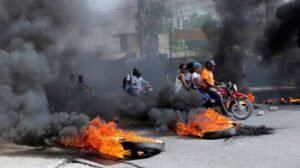On Tuesday evening, the fractured transitional council of Haiti’s coalition government named a new Prime Minister, Garry Conille.
Council member Louis Ġerald Gilles informed the AP that six out of seven council members with voting power choose Conille earlier Tuesday. He said one member, Laurent St. Cyr, was not in Haiti and therefore did not cast his vote.
Additionally, the nine member transitional council, with 7 members having voting powers also has to appoint a provisional electoral commission, prior to general elections in the country by the end of 2024. The council’s non-renewable mandate expires Februray 7,2026 at which date a new president is scheduled to be sworn in. A new cabinet needs to selected as well.
Since 2021, Haiti has been functioning without a President after the last president Jovenel Moïse was killed by armed men who broke into his bedroom and shot him dead in front of his wife. His murder is still under separate investigations in Haiti and Florida, with a trial scheduled to take place in Miami in January.
Who is Haiti’s new PM, Garry Conille ?
Conille attained a degree in political and health administration and has helped in developing healthcare in impoverished communities spread across the Carribean country. After serving the UN for several years, he was designated UNICEF’s regional director for Latin America and the Caribbean.
It is not the first time that Conille has been selected as PM. From October 2011 to May 2012, he was in office of the PM serving under the Presidential leadership of Michael Martelly. But resigned less than a year later due to clashes with the President and his government over an investigation into government officials with dual nationality, declared illegal by Hatian constitution.
Presently, he has replaced Michael Patrick Bosivert, the interim Prime Minister after Ariel Henry’s resignation via a letter in late April.
Also Read: Bill Walton: NBA Hall of Famer and Legendary Broadcaster passes away at 71
A country under terror
Haiti’s capital city, Port-au Prince is suffering from extreme levels of threat by gangs. Open fire and use of heavy machinery to demolish buildings such as police stations and prisons have set the city in turmoil.

On february 29, a coalition of powerful gangs launched coordinated attacks, seizing control of police stations, firing at Haiti’s major international airport and storming the country’s two biggest prisons, releasing more than 4000 inmates.
Gangs in Haiti’s capital city control at least 80% of the city and have forced over 360,000 people from their homes and sieged key routes from the city to Haiti’s northern and southern regions, hindering the transporation of critical goods.
A $300 million funding commitment by the Biden administration has already started sending aid to the violence torn Carribean country. U.S. military planes filled with civilian contractors and supplies have already begun landing in Haiti, paving the way for the seven-nation security mission.











